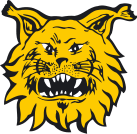Ilves
| Ilves | |
|---|---|
| City: | |
| League: | SM-liiga |
| Founded: | 1931 |
| Home Arena: | Hakametsä (capacity 7,600) |
| Colors: | |
| Head Coach: | |
| General Manager: | |
Ilves (Finnish for "Lynx") is a Finnish sports club known for its youth work. Its ice hockey team plays in the SM-liiga at the Hakametsä.
The colors of Ilves, green, yellow and black, were taken from what was then the coat of arms of the city of Tampere.
History
With 16 championships, Ilves is the most successful team in the Finnish championship league, the SM-liiga. The club was founded in the spring of 1931, and it played its first game against Tampereen Palloilijat the next winter. In the late 1930s, Ilves won three Finnish championship titles.
After World War II, Ilves started playing its home games at the then new Koulukatu ice rink. It had another championship spree in 1945–47 when it stayed undefeated for over four years (albeit playing only 36 games during that period).
In 1954 Ilves was for the first and so far only time relegated to the second highest level of Finnish hockey but managed to return to the top tier only one year later.
The current logo was designed by Rauno Broms in 1963. In 1965 Ilves moved, along with its local rivals Tappara and KooVee, to the new Hakametsä arena, where they still play.
The last Finnish Cup competition in hockey was held in 1971. Ilves won the title and has therefore been the reigning champion since. In 1972 it also won another league championship, its 15th in total.
During the late 1970s, Ilves went through lean times. Finally, when Koovee, which was in no better condition, was relegated at the end of the 1979–80 season, the two clubs decided to sign an agreement of cooperation. The best players of Koovee moved to Ilves, the most notable of them being Risto Jalo.
In 1985, Ilves claimed its 16th and most recent championship. Along with Risto Jalo, the key players of that team were Raimo Helminen, Mikko Mäkelä, Ville Siren, and Jukka Tammi. Repeating this success proved difficult, however, when in the following summer four players left the team to play in the NHL.
In the late '80s, Ilves had another brief stint of moderate success when coached by Sakari Pietilä. It finished first after the regular season in 1988 but was eliminated in the first round of playoffs. The next year it came away with a bronze medal, and finally in 1990 it reached the finals, only to lose to TPS.
For most of the 1990s, the club struggled with financial problems and unclear issues concerning ownership. In sports performance, the low point was in the spring of 1995, when Ilves finished last in the SM-liiga and had to fight the lower league teams SaPKo and SaiPa for their place among the elite for the next year.
Ilves managed to avoid relegation and was promptly reborn as a viable championship candidate, reaching the semifinals in 1997 and the finals a year after that. No trophies were brought home, however, and the heavy financial investments proved unsound as the club was suddenly facing the risk of bankruptcy in the fall of 1999. By selling players and cutting the wages of the entire organization, Ilves was able to stay afloat.
The 2000s were a fairly mediocre period in Ilves history. After their bronze medal win in 2001, Ilves lost in the first round of the playoffs in six of the next seven seasons and missing the playoffs altogether in 2003. They managed to avoid relegation in 2010 and 2012. The financial situation, however, seems to be more secure than in previous decades.
Honors
Champions
Ilves is the most decorated club in Finnish hockey. However, they have not won a league championship since 1985. In addition to having more men's championship wins than any other club, they also have that distinction in every junior level (with the exception of junior C (U-16) where Jokerit has one more) and the most women's hockey championships. In total, Ilves has won 67 national championship titles, 30 more than the second-best club.
- Champion SM-liiga Kanada-malja (1): 1985
- Champion SM-sarja Kanada-malja (6): 1957, 1958, 1960, 1962, 1966, 1972
- Champion SM-sarja Aaro Kivilinna memorial award (9): 1936, 1937, 1938, 1945, 1946, 1947, 1950, 1951, 1952
Runners-up
- Runner-up SM-liiga Kanada-malja (2): 1990, 1998
- 3rd place SM-liiga Kanada-malja (3): 1983, 1989, 2001
- Runner-up SM-sarja Kanada-malja (4): 1965, 1968, 1969, 1970
- 3rd place SM-sarja Kanada-malja (5): 1963, 1964, 1967, 1974, 1975
- Runner-up SM-sarja Aaro Kivilinna memorial award (3): 1935, 1948, 1949
- 3rd place SM-sarja Aaro Kivilinna memorial award (4): 1934, 1939, 1941, 1943
References
External links
| This page uses Creative Commons Licensed content from Wikipedia (view authors). |
